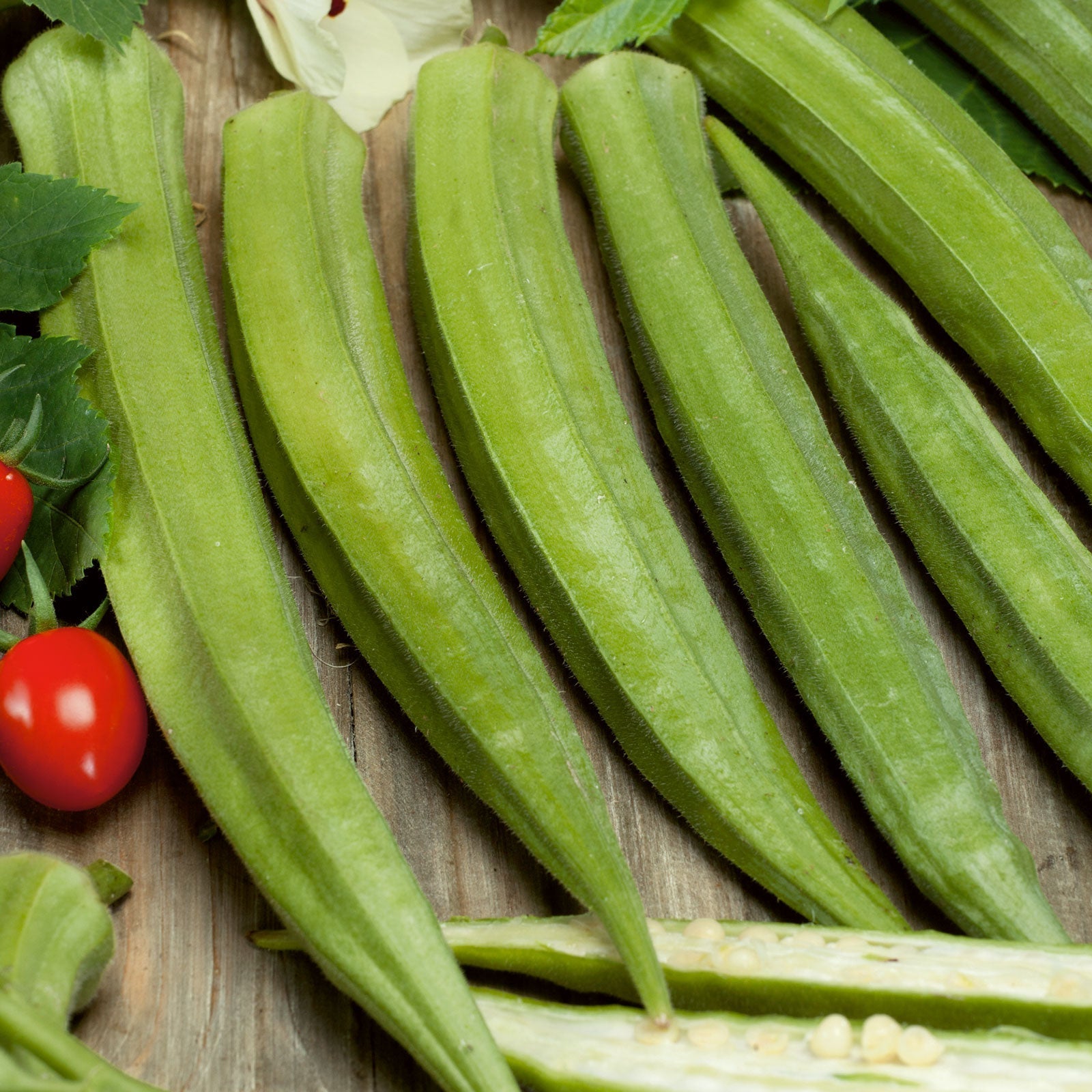
Dharaseeds
Okra Seeds (Organic) - Cow Horn
Estimated Free Delivery between April 16 and April 19.
Secured Payment Methods
Your transaction is protected with advanced security measures to keep your information confidential
Cow Horn is a unique and heirloom variety of okra, known for its long, curved pods that resemble the shape of a cow's horn. This organic variety stands out for its vigorous growth, high yield, and ability to produce tender, mild-flavored pods even in extreme heat. Ideal for gardeners who want a reliable and productive crop, Cow Horn okra offers both aesthetic value and culinary versatility, making it a favorite in organic vegetable gardens.
Key Benefits
- Organic and Heirloom: Grown organically without pesticides or synthetic fertilizers, ensuring a healthy and safe harvest.
- Long, Curved Pods: The distinctive shape of the pods, which can reach up to 10 inches long, adds visual appeal to your garden.
- Tender and Mild Flavor: Even when fully mature, Cow Horn okra retains its tender texture and mild, slightly sweet flavor, making it ideal for various dishes.
- Heat-Tolerant: Well-suited for hot and dry climates, thriving in full sun with minimal care.
- High Yield: Known for producing an abundant harvest of large, high-quality pods over an extended growing period.
Variety Features
- Plant Characteristics: Cow Horn okra plants grow to a height of 4–5 feet with strong, upright stems and large green leaves. The plants are robust and well-suited to warmer climates.
- Fruit Characteristics: The pods are long, slender, and curved, resembling the horns of a cow, and can reach up to 10 inches in length.
- Flavor Profile: Mild and tender with a slightly sweet taste when harvested young.
- Size: Cow Horn okra plants grow 4–5 feet tall, and the pods measure 8–10 inches in length.
Planting Instructions
Planting Season
- Planting Time: Sow seeds in late spring or early summer once the soil temperature has reached 75°F–85°F (24°C–29°C).
- Ideal Temperature: Cow Horn okra thrives in hot temperatures and requires a long growing season to mature fully.
Planting Details
- Seed Depth: Plant seeds 1 inch deep into well-drained, fertile soil.
- Spacing: Space plants 12–18 inches apart in rows that are 36–48 inches apart to ensure proper growth and air circulation.
- Soil Requirements: Prefers well-draining, fertile soil with a slightly acidic to neutral pH (6.0–7.0).
- Sunlight: Requires full sun for optimal growth and pod production.
Care Instructions
Watering
- Consistent Moisture: Keep the soil consistently moist, particularly during dry spells, but avoid overwatering to prevent root rot.
- Watering Method: Water deeply and at the base of the plant to encourage strong root development and reduce the risk of disease.
Fertilization
- Organic Fertilizer: Apply an organic, balanced fertilizer or compost at planting and again when the plants are about 6 inches tall for healthy growth.
- Soil Enrichment: Enrich the soil with organic matter to promote fertility and improve soil structure.
Weeding and Mulching
- Weeding: Keep the area around the okra plants free of weeds to reduce competition for nutrients and water.
- Mulching: Apply mulch around the base of the plants to retain moisture, regulate soil temperature, and reduce weed growth.
Pest and Disease Control
- Pests: Watch for pests like aphids, flea beetles, and caterpillars, which can affect okra. Use organic pest control methods such as neem oil or insecticidal soap.
- Diseases: Okra is susceptible to fungal diseases, such as downy mildew. Rotate crops each year and maintain good garden hygiene to prevent disease buildup.
Harvesting
- Maturity: Cow Horn okra typically reaches maturity in 55–65 days, depending on weather and growing conditions.
- Harvesting Size: The pods are best harvested when they are 8–10 inches long and still tender. Older pods become tough and fibrous.
- Method: Gently snap or cut the pods from the plant, being careful not to damage the stems or branches. Harvest regularly to encourage continued pod production.
Storage
- Short-Term Storage: Fresh okra can be stored in the refrigerator for up to 5 days in a perforated plastic bag.
- Long-Term Storage: For long-term storage, blanch the okra in boiling water for 2–3 minutes, cool it in ice water, and freeze it to preserve its quality and flavor.
Culinary Uses
- Fried Okra: Slice the pods into rounds, coat in cornmeal, and fry for a crispy, golden snack or side dish.
- Pickled Okra: Cow Horn okra makes an excellent addition to pickling recipes, offering a tangy, crunchy texture.
- Soups and Stews: Add sliced okra to soups and stews for a mild flavor and natural thickening agent.
- Grilled or Roasted: Toss okra with olive oil and your favorite seasonings, then grill or roast for a delicious side dish.
- Stir-Fries: Cow Horn okra adds flavor and texture to stir-fried vegetables.
Conclusion
Cow Horn okra is a distinctive and productive variety perfect for organic gardeners who appreciate both beauty and function in their crops. Its long, curved pods, tender texture, and mild flavor make it ideal for a variety of culinary uses, from fried okra to pickling and soups. Whether you're growing it for aesthetic appeal or as a tasty addition to your meals, Cow Horn okra is a resilient and reliable choice for gardeners in hot climates.









